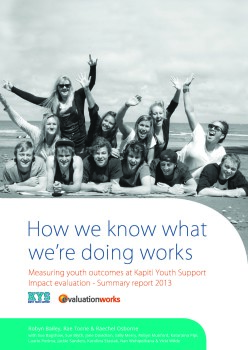An innovative approach to measuring youth health and well-being outcomes has produced benefits that can now be applied to other youth organisations and services as well as a wide range of NGOs.
The project began when Wellington consultancy Evaluation Works teamed up with Kapiti Youth Support (KYS), an integrated, interdisciplinary Youth One Stop Shop, to measure the effectiveness of their service’s outcomes for youth health and wellbeing.
To do this in a way that would satisfy clinicians, youth professionals, and funders meant developing a model from the ground up, that met their differing needs, was methodologically robust, reflected and didn’t change practice, and looked simple.
“The key is the way in which the outcomes tool provides professionals from widely-differing disciplines in the organisation with a ‘shared language’,” says Evaluation Works principal Rae Torrie.
“The outcome measures provide a kind of ‘shorthand’ and shared understanding that helps break down some of those silos that each discipline can find itself in,” says Torrie.
Underpinning the KYS project was a ground-breaking model that Torrie and her colleague Robyn Bailey developed with KYS over a four year period. It included a detailed and standardised measurement process, descriptors and rating scale for youth health and wellbeing outcomes ranging from seriously at risk through to thriving.
“A key part of the model’s design was that, while being conceptually robust and methodologically sound, it had to be simple and user-friendly for the professionals in the field to use,” says Bailey.
“It turned out that these design principles were key. They led to the development of a successful tool when it could easily have become just another annoying data gathering exercise for staff with little relevance to their day to day work,” she says.
A model for other youth organisations and NGOs
The model developed by Evaluation Works in conjunction with KYS was designed from the start to be portable which means that other organisations will soon be able to benefit from this work.
“The extensive work from this four year project on what outcomes look like, detailed descriptors and so on can give many organisations a quick path to capturing robust evidence of the changes made by people using their services” says Torrie.
Contact and further information
If you would like further information, go to Projects / Youth outcomes measurement. If you’d like to find out more about the Summary report from the project or to find out more about this project and how it can be applied to your organisation, contact Rae Torrie or Robyn Bailey.
